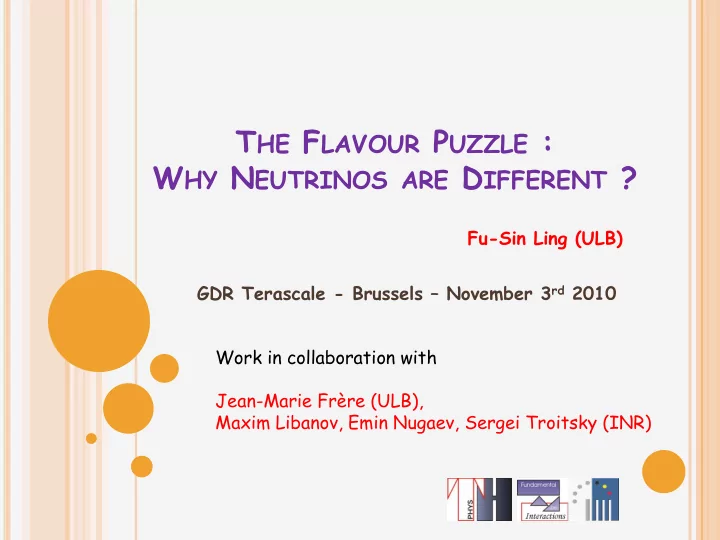

T HE F LAVOUR P UZZLE : W HY N EUTRINOS ARE D IFFERENT ? Fu-Sin Ling (ULB) GDR Terascale - Brussels – November 3 rd 2010 Work in collaboration with Jean-Marie Frère (ULB), Maxim Libanov, Emin Nugaev, Sergei Troitsky (INR)
T HE FLAVOUR PUZZLE IN A NUTSHELL Why three families in the SM ? Hierarchical masses + small mixing angles Why massive neutrinos ? Tiny masses + two large mixing angles Why very suppressed FCNC ? Strong limits on a TeV scale extension of the SM
T HE FLAVOUR PUZZLE IN A NUTSHELL Why three families in the SM ? Hierarchical masses + small mixing angles Why massive neutrinos ? Tiny masses + two large mixing angles Why very suppressed FCNC ? Strong limits on a TeV scale extension of the SM Proposed solution : A model of family replication in 6D
3 FAMILIES IN 4D FROM 1 FAMILY IN 6D Vortex in 6D U(1) g gauge field A + background scalar field F Family replication One single fermion coupled to vortex leads to several (three ?) chiral zero-modes (index theorem) New quantum number Family number in 4D corresponds to winding number in extradimensions
3 FAMILIES IN 4D FROM 1 FAMILY IN 6D Vortex in 6D U(1) g gauge field A + background scalar field F
A BIKOSOV -N IELSEN -O LESEN VORTEX A vortex on a sphere is in fact like a magnetic monopole configuration in 3D
3 FAMILIES IN 4D FROM 1 FAMILY IN 6D Fermion zero-modes Different profile and different winding around the vortex e i0 f e i1 f Narrow B-E-H scalar e i2 f Note that the profiles are determined by a Dirac equation in the vortex background
F IELD CONTENT OF THE MODEL
H IERARCHICAL D IRAC MASSES Integration over f d (n-m)
N EUTRINOS MASSES Why is it different ? See-saw mechanism Integration over f d (4-n-m)
N EUTRINOS MASSES Consequences of this structure Inverted hierarchy with a pseudo-Dirac pair Solar angle automatically large Small reactor angle U e3 ~ d Correct prediction for D m 2 ratio ~ d 2
N EUTRINOS MASSES Consequences of this structure 0 nbb decay partial suppression
N UMERICAL EXAMPLE With a good selection of Yukawa operators, we can get Possibility to have a bimaximal mixing
N UMERICAL EXAMPLE
N UMERICAL EXAMPLE Consequence for 0 nbb decay Partially suppressed effective Majorana mass
F LAVOUR VIOLATION Frère et al. hep-ph/0309014 Like in the UED, vector bosons can travel in the bulk of space. From the 4D point of view : 1 massless vector boson in 6D = 1 massless vector boson (zero-mode) + KK tower of massive vector bosons + KK tower of massive scalar bosons in 4D KK scalar modes do not interact with fermion zero- modes
F LAVOUR VIOLATION Frère et al. hep-ph/0309014 KK vector modes carry a family number = winding number. In the absence of fermion mixings, family number is an exactly conserved quantity Example: FCNC with D G=0 K L → m + e - or m - e + d e - Z 1 Flavour violating m + s Family conserving
F LAVOUR VIOLATION Frère et al. hep-ph/0309014 All processes with D G ≠ 0 automatically suppressed by small fermion Cabibbo mixings m - → e - e - e + D G=1 m - → e - g m - → e - on nuclei D G=2 K L - K S mass difference and CP violation Less constraining !
S EARCH AT LHC Frère et al. hep-ph/0404139 Search for massive Z’ e - d Search for pp → m + e - + ... Z 1 (pp → m - e + + ... lower by a factor m + 10 due to quark content of proton) s L = 100 fb -1 K L → m + e - or m - e + forbidden LHC beats fixed target Tevatron limit
C ONCLUSIONS Family replication model in 6D : elegant solution to the flavour puzzle Hierarchical Dirac masses + small mixing angles See-saw : can fit neutrino data Universality of gauge structure like in SM Family number violating FCNC suppressed by small fermion mixings Predictions for neutrinos Inverted hierarchy Reactor angle ~ 0.1 Partially suppressed neutrinoless bb decay
C ONCLUSIONS Testable at LHC Massive gauge bosons can carry a family number Search for massive gauge bosons with mass ~ TeV or higher Search for pp → m + e - + ... can beat fixed target
Recommend
More recommend